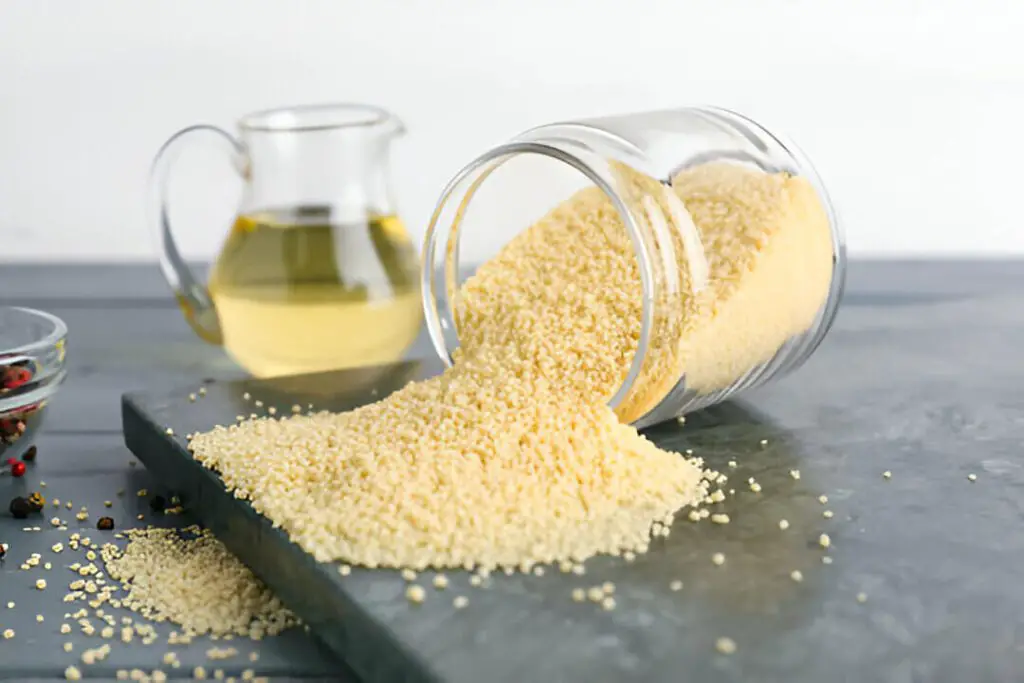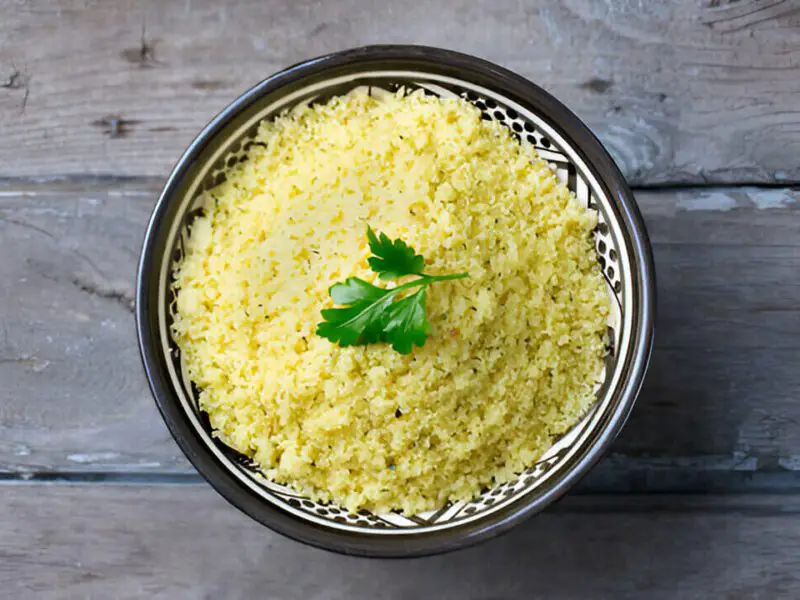You were feeling adventurous at the grocery store and decided to pick up a box of couscous. But then life got in the way, and that box of tiny pasta pearls has been chilling in your pantry for, well, way too long. Suddenly you’re hit with a bout of panic—does couscous go bad?
If you’ve found yourself in this culinary conundrum, you’ve come to the right place. Getting the shelf life right on dried grains and pastas can be tricky. Maybe you cracked open that couscous only for it to smell a little off, or perhaps you just don’t want to risk food poisoning from some expired semolina.
Not to worry; we’ve got all the answers you need on whether couscous stays fresh forever or eventually goes stale. From proper storage tips to sniffing out signs of spoilage, this guide will turn you into a couscous connoisseur. Say goodbye to doubting those dusty packages in the back of your pantry and hello to fluffy, fresh couscous every time
What Is Couscous?
Couscous is made from semolina wheat that has been steamed and dried to form those miniature balls you’re familiar with.
While you may find large-pearl varieties or versions made from other grains like barley or corn, we’re focusing on the classic instant couscous that lines grocery store shelves. This convenient product cooks up quickly by simply adding boiling water or broth and letting it steam.
Couscous originated in Morocco and has been a staple in many North African countries. These tiny granules are incredibly versatile; they can be the star of pilafs and salads or make the perfect side to soak up flavorful stews and tagines.
In terms of nutrition, couscous provides a good source of plant-based protein, fiber, and some B vitamins. However, it is relatively low in other essential nutrients unless you opt for a fortified variety. Whole wheat couscous offers more fiber and micronutrients compared to regular semolina.
While couscous is designed to be quick-cooking and convenient, this mighty tiny pasta has some impressive longevity—as long as you store it properly. Keeping it fresh is key to avoiding a mushy, insipid mess or even potential food safety issues from spoilage.
How to Properly Store Couscous?
Proper storage is the key to making sure your couscous doesn’t go from pleasantly plump and fresh to shriveled and stale before you can say, “Steam me!” With a few simple tips, you can keep those tiny granules in tip-top shape.
For Uncooked Dry Couscous
This shelf-stable product does best in a cool, dry environment away from humidity and moisture. Your best bets are a sealed container in the pantry or a kitchen cabinet. The keys are in an airtight container with consistent cool temperatures around 70°F.
If your couscous came in a box or bag that isn’t resealable, transfer it to an airtight container or zip-top bag once opened. This protects it from potential pantry pests and keeps moisture and air from creeping in and turning it stale.
Pro tip: Mason jars make great dry storage containers for grains, pastas, and more. Their seal is tough to beat.
For Cooked Couscous
Once you’ve steamed or boiled your couscous, the storage guidelines change. Cooked leftovers should be transferred to a shallow, airtight container and refrigerated within two hours to prevent bacteria growth.
Refrigerating hot foods can cause condensation and lead to sogginess. Let your cooked couscous cool slightly before packing it up. This helps it retain its delightfully fluffy texture.
Don’t want to risk your couscous drying out in the fridge? Add a tablespoon or two of stock or water before refrigerating and give it a stir before reheating to revive its moisture.
No matter how you store couscous, always keep it away from heat sources like the stove or oven. Direct heat can zap moisture and leave you with sad, shriveled granules.
How Long Does Couscous Last?
One of the beauties of couscous is its impressive shelf life—when stored properly, of course. But just how long can you keep those little granules around before they lose their luster? Let’s take a look at the shelf life for both dry and cooked couscous.
Dry, Uncooked Couscous
This is where couscous really shines in the longevity department. While that “best by” date may make it seem like your couscous only has a few months left, don’t be fooled! Dry couscous can easily remain fresh and delicious for 6 months to 1 year past the date stamped on the package.
The key Is keeping it sealed up tight in a cool, dry place away from humidity, heat, and pests. With proper storage, there’s no firm expiration date on dry couscous. As long as it still looks, smells, and tastes fresh when you go to use it, that couscous is still safe to cook up!
Some people have reported keeping dry couscous for 2-3 years past the package date with no issues. But expect quality and taste to degrade the longer you wait to use it. Your couscous may start to lose its fresh aroma and plump, tender texture.
Cooked Couscous
Unfortunately, the party ends a bit sooner once you’ve steamed or boiled your couscous. Cooked leftovers will only maintain peak freshness for about 3–5 days in the refrigerator.
After the 5-day mark, you’ll likely notice your couscous starting to dry out, develop off-flavors, and potentially grow bacteria that could cause foodborne illness. Keeping cooked couscous any longer than 5-7 days is not recommended.
To maximize the short fridge life, always store cooked couscous in an airtight container. Adding a tablespoon or two of extra liquid, like broth or water, can help it retain moisture as well.
You can also extend its life a bit further by freezing it. Frozen cooked couscous will keep for 10–12 months. Just portion it out into airtight containers or bags before freezing. Thaw overnight in the fridge before reheating.
How to Tell if Couscous Has Gone Bad?

As with any food product, couscous can eventually go bad, even if you store it perfectly. Knowing what to look for (and smell for) can prevent you from inadvertently cooking up and consuming spoiled couscous. Trust your senses; they’re the best tools for identifying couscous that’s no longer safe or appetizing to eat.
For Uncooked Dry Couscous
Bugs/Insects: One of the biggest giveaways that dry couscous has gone bad is the presence of small beetles, weevils, or other pantry pests. If you see any bugs, dead or alive, toss the whole package.
Mold: If you spot any fuzzy mold growth on the couscous granules themselves, it’s a definite sign that moisture has gotten in and allowed mold to propagate. Moldy couscous needs to be discarded.
Off Smells: Does your couscous smell musty, stale, rancid, or just not quite right? Trust your nose on this one. Dry couscous should have a very mild, fresh scent. Funky odors indicate spoilage.
Discoloration: Dry couscous should be an even tan or pale yellow color. If you notice any dark spots, greening, or other discoloration, it’s best to avoid eating it.
For Cooked Couscous
Sour Smell: Freshly cooked couscous should have a pleasantly mild, slightly nutty, or wheat-like aroma. If it smells sour, tart, or off in any way, it has likely spoiled.
Dryness/Hardness: Cooked couscous kept too long will become dry, hard, and may even start to crack or crumble. This textural change makes it unappetizing.
Visible Mold: As with dry couscous, any visible mold growth is an automatic toss. Mold can produce mycotoxins that can make you ill.
It’s Been Over 1 Week: Use your best judgment, but generally, cooked couscous kept longer than 5-7 days in the fridge isn’t worth the risk of potential bacterial growth.
If your couscous has developed an off smell, flavor, or texture and you have any doubt about its freshness and safety, the best practice is to discard it. Couscous is cheap and easy to replace, so it’s not worth risking foodborne illness over.
The good news is that, when stored properly, couscous very clearly exhibits signs when it has gone bad. As long as you keep your dry and cooked couscous sealed, follow recommended fridge times, and stay alert to any funky smells or growth, you can enjoy fresh couscous for months!
The Couscous Connoisseur’s Final Tips
You’re now a master of couscous storage and safety. But before sending you off to perfectly plump pasta bliss, here are a few final tips for making the most of this tiny grain’s flavor and longevity:
Don’t Dismiss That “Stale” Scent
Upon first opening a package of dry couscous that’s been sitting for a while, you may get a whiff of something stale or flat. Don’t panic! This is totally normal and doesn’t necessarily mean your couscous is spoiled.
Dry couscous lacks added fats or oils that can go rancid. That stale scent is usually just an absence of fresh aroma after being sealed up. Give your dry couscous a good sniff after cooking; if it smells fine, it’s likely still safe to eat.
Season It Up
Let’s be honest, plain couscous is pretty bland on its own. Those tiny pearls need a flavor boost to truly sing. Don’t be afraid to get liberal with seasonings like salt, pepper, spices, herbs, citrus zest, etc.
Cooking couscous in broth instead of water is an easy way to amp up that savory essence. A pat of butter or drizzle of olive oil doesn’t hurt either! Seasoning generously also helps mask any potential flatness from age.
Storage Experiment
While general guidelines are helpful, every kitchen’s environment is a bit different in terms of temperature, humidity levels, and more. Do your own storage experiments to get a feel for your couscous’s peak freshness window.
Take note of how long yours tends to stay fresh and, at what point, off-flavors or aromas start to creep in. You may find that your properly sealed couscous stays fresh for even longer than expected in your cool, dry pantry.
The Cooked Couscous Refresh
If your cooked couscous is just starting to dry out or get a touch stiff in the fridge, you can try reviving it before tossing it out. Simply stir in a few tablespoons of warm broth, stock, or water until it plummets back up and becomes fluffy again.
You can also try steaming it briefly to refresh the moisture levels. As long as there’s no sour, off-putting smells, this can buy you an extra day or so with your couscous leftovers.
FAQs
Can I freeze uncooked dry couscous?
Yes, you can freeze uncooked dry couscous to extend its shelf life even further. Transfer the couscous to an airtight, freezer-safe bag or container, and it can be frozen for 6–12 months. Let it thaw completely at room temperature before cooking.
Is it safe to eat couscous that’s been left out overnight?
No, it’s not recommended to eat couscous that has been left at room temperature for more than 2 hours. Cooked couscous should be refrigerated promptly after cooking to prevent bacterial growth that could lead to foodborne illness. If left out too long, it’s best to discard it.
Can I revive stale, dried-out couscous after cooking?
You can try reviving stale, dry-cooked couscous by adding a small amount of warm broth, stock, or water and briefly steaming it. Fluff it with a fork as the liquid is absorbed to rehydrate and plump up the couscous. However, if it smells sour or “off,” it’s best to discard it.
Is whole-wheat couscous more nutritious?
Yes, whole wheat couscous is more nutritious than regular couscous made from refined semolina flour. Whole wheat varieties contain more fiber, protein, vitamins, and minerals compared to the refined version.
How can I tell if a box of couscous is truly “instant” or not?
Look on the package for wording like “instant,” “quick-cooking,” or anything indicating it’s the pre-steamed, fast variety. If it just says “couscous” with longer traditional cooking instructions, it’s likely the longer-cooking type.
Can couscous make you sick if it goes bad?
Yes, eating spoiled couscous that has gone moldy or developed harmful bacteria can potentially cause foodborne illnesses like food poisoning, stomach cramps, nausea, and vomiting. Always inspect couscous for signs of spoilage and discard it if you have any doubts about its freshness.



